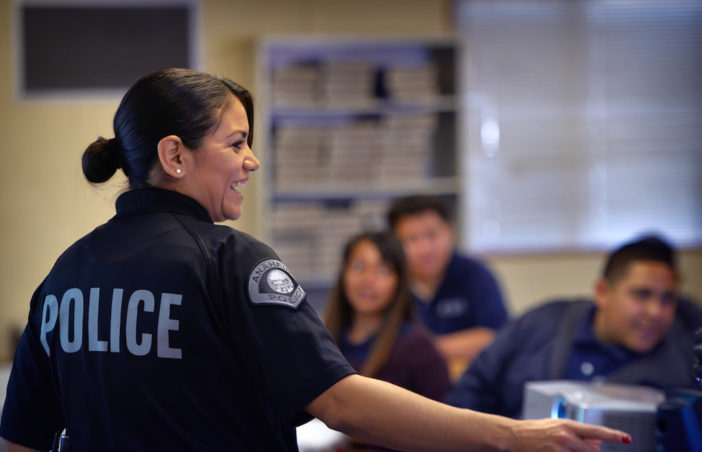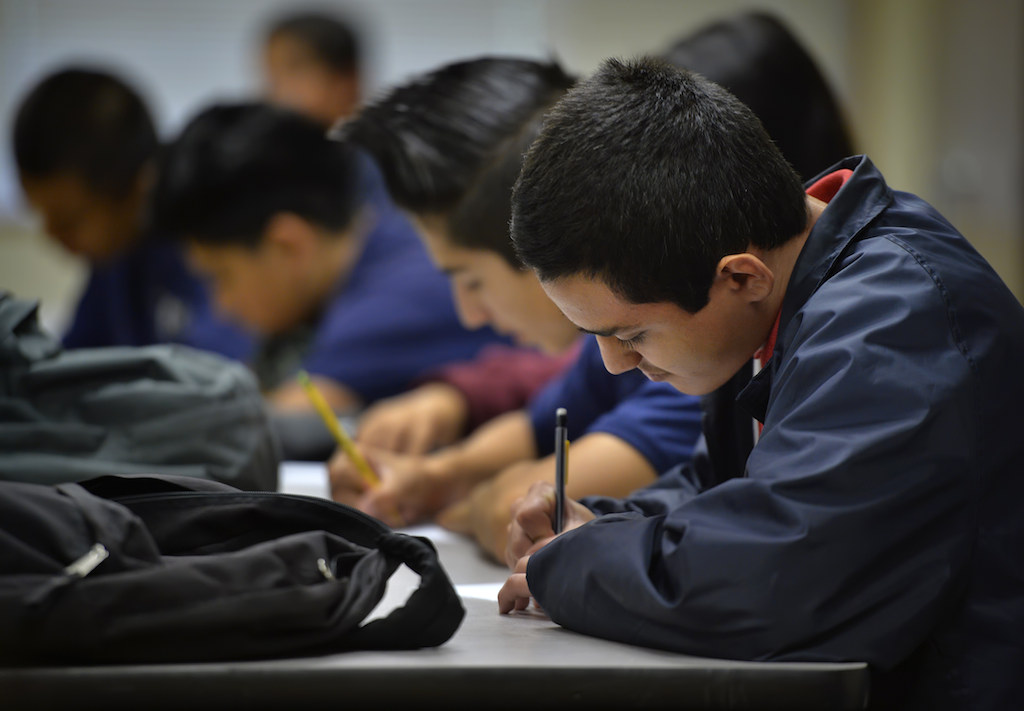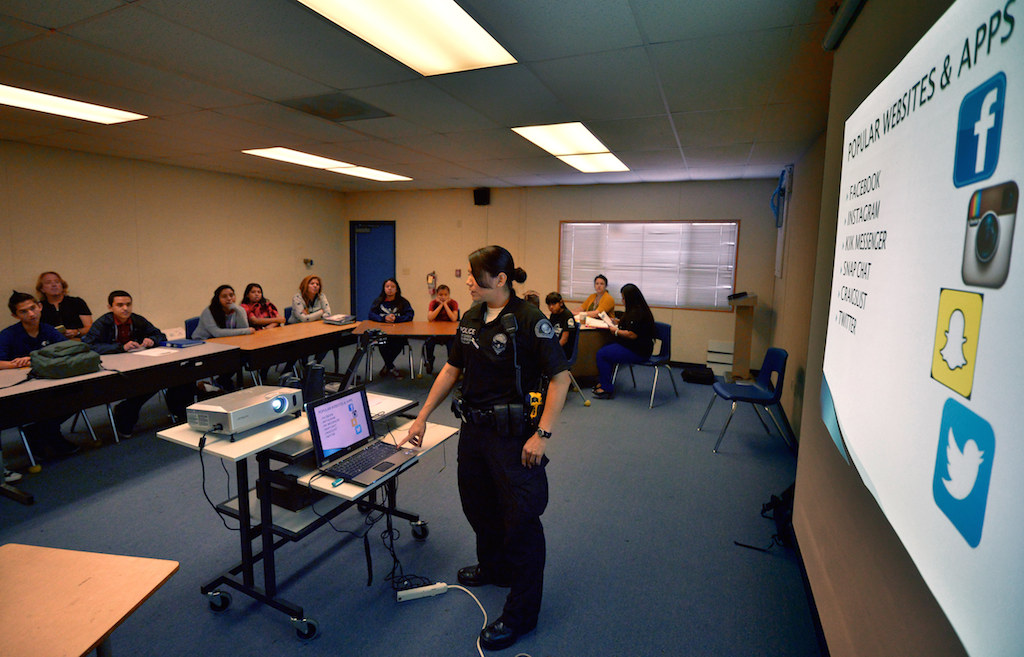One of them wears an ankle bracelet that monitors his movements because of an act of vandalism.
Another has been cited twice for marijuana possession. He also recently stole an iPod, but the victim decided not to press charges.
These aren’t hardened criminals, but two students at a junior high school in Anaheim.
The boy with the ankle bracelet is 14.
The other is a wisp of a seventh-grader who maybe weighs 60 pounds. The iPod he stole belongs to his teacher.
In the eyes of police officer Flora Palma, an investigator with the Anaheim PD’s Safe Schools Details, these boys are far from lost causes.
Rather, they’re kids who’ve made bad choices who, with the right intervention, stand a chance of becoming responsible adults.
And that’s where Palma comes in.
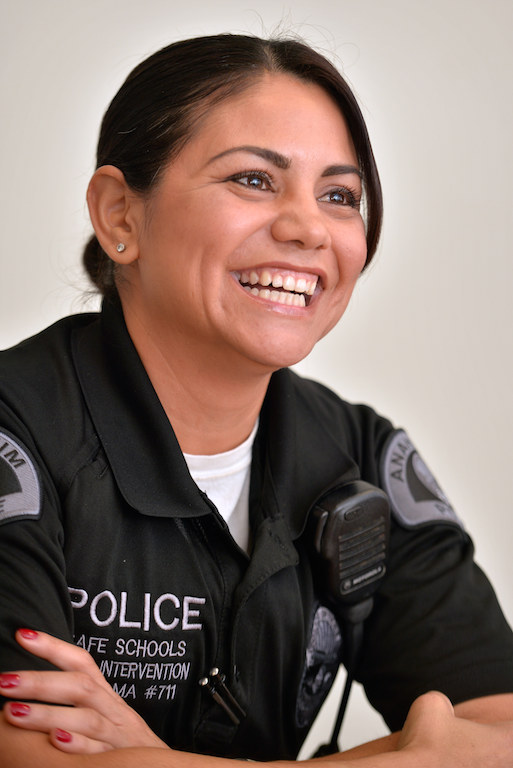
Palma gives a big smile as she talks about the kids she works with.
Photo by Steven Georges/Behind the Badge OC
As a mother with a lifelong interest in education – her mom and sister both are teachers — Palma has an ideal assignment on the Safe Schools Detail, possessing a firm but nurturing hand with students ranging from elementary to high school age.
“How was Spring break?” Palma greeted students in a recent OC GRIP (Gang Reduction and Intervention Partnership) class at the junior high schol — the last of four weekly lessons for 18 students hand-picked by teachers to be GRIP participants.
“It went fast,” one student said.
“So you’re saying you’re going to miss me?” Palma shot back.
“I’m going to miss your good advice,” said the boy — the one with the ankle bracelet.
Over the last three years, the Anaheim PD, in a partnership with the Orange County District Attorney’s Office, has implemented GRIP at 12 schools throughout the city.
And every day, its five investigators and one sergeant on the Safe Schools Detail keep a close eye on the city’s nine high schools, seven junior high schools and more than 40 elementary school.
Palma, on the Safe Schools Detail since October 2014, handles two high schools, one junior high school and one elementary school.
She investigates all law violations occurring at the schools (or crimes involving students on the way to school or on their way home, such as child annoyance) and makes presentations to students, school staff and parents — with the goal of keeping kids in school and away from trouble.
Palma saw a lot of trouble growing up in San Bernardino County but she steered clear of it herself. She turned to sports and played volleyball, soccer and softball in high school (she went on to play soccer in college and now plays for the Southern California law-enforcement team).
Fighting.
Vandalism.
Drug use.
They were all too-common problems Palma saw growing up that still are prevalent today at schools not just in Anaheim, but everywhere.
Her job, she says, is to try to inspire kids to be their best — and one way is to relate to them as a person and not just a cop.
“Many of these kids are anti-police because they or someone in their family has gotten into trouble with the law,” Palma says.
“Hopefully, they see beyond my uniform and see a police officer in a different way and connect with me so maybe, the next time they see a cop on the street, instead of turning and running away they will wait for the officer to make contact with them.”
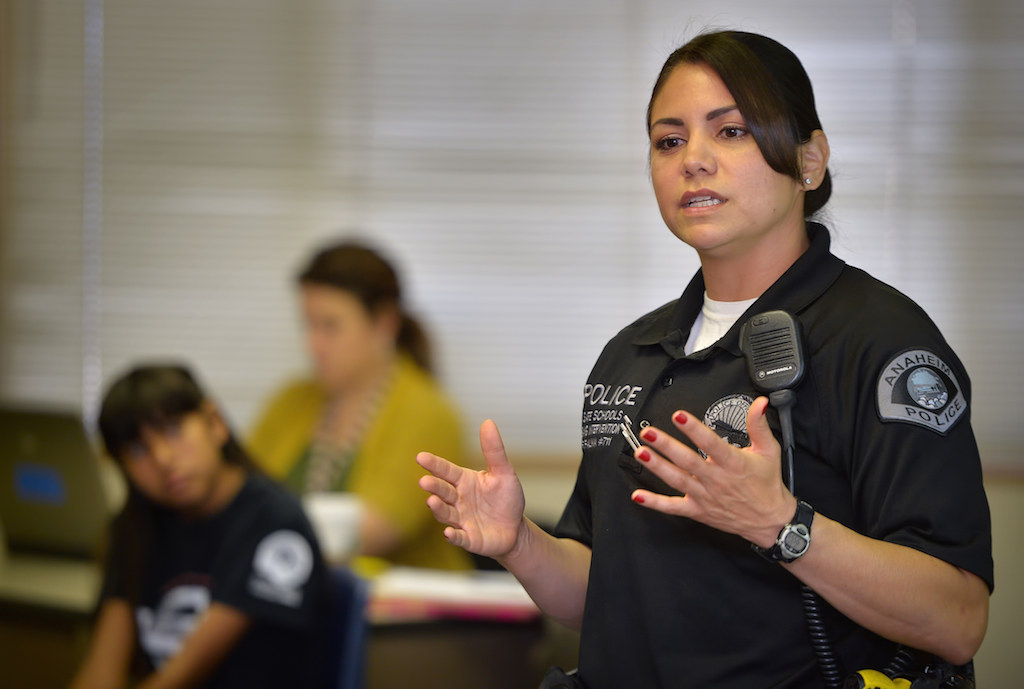
Palma is a mother of an 11-year-old girl and says being a mom helps her be a better cop. Photo: Steven Georges
Palma says she hated bullies as a little girl and always felt the need to help those being bullied — one of the reasons, she says, she pursued a career in law enforcement.
Her plans to become a cop in her early 20s were sidetracked when she got married and decided to focus on motherhood.
In 2008, when Palma was 30 and a single mother, the Anaheim PD sponsored her and she graduated from the police academy at Golden West College. She then was hired by the Anaheim PD.
“The agency has a great reputation,” she says. “I wanted to join the varsity team.”
Palma worked the graveyard patrol shift for six years before joining the Safe Schools Detail.
In the final one-hour OC GRIP class at the junior high schol, the topic was “Social Media and Self-Esteem.”
Assisted by Anaheim PD civilian GRIP manager Carmela Mendoza, Palma showed the kids a Power Point presentation and two videos — one that detailed the tragic story of how bullying led to the suicide of Amanda Todd, and the other about a boy born armless who didn’t let his disability prevent him from achieving his dream job of NASCAR engineer.
Palma warned the students about the dangers of sexting — not only in terms of breaking the law, but the potentially devastating consequences of having a nude image of oneself spread around the school and live forever online, affecting everything from self-esteem to potential jobs.
“You can be arrested for sexting,” Palma told the GRIP students. “It’s very easy for me to file these cases.”
She added: “Just because someone asks you for a nude photo doesn’t mean you have to send one.”
Palma warned the students that cyberbullying also could lead to suspension or expulsion.
“This is real life,” she said after showing the video of Todd that went viral after the Canadian girl took her life.
She urged the students to choose their friends wisely and to make good choices.
“Nothing’s going to be easy,” Palma said. “You’ve got to earn it.”
They are words Palma tells her daughter.
But she makes sure to deliver such a message in a caring, nurturing manner — hoping that not only her daughter, but also all youngsters she encounters are listening.
“I’m a cop,” Palma says, “but my No. 1 job is being a mom.”
 Behind the Badge
Behind the Badge
